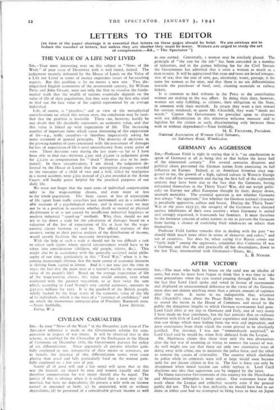LETTERS TO THE EDITOR
[In view of the paper shortage it is essential that letters on these pages should be brief. We are anxious not to reduce the number of letters, but unless they are shorter they must be fewer. Writers are urged to study the art of compression.—Ed., " The Spectator "1
THE VALUE OF A LIFE NOT LIVED SIR,—Your most interesting note on this subject in "News of the Week " of your issue of December zoth is well timed, indeed. The judgement recently delivered by the House of Lords on the Value of a Life not Lived in terms of money engenders issues of far-reaching aspects. But this problem is by no means a new one. Two dis- tinguished English economists of the seventeenth century, Sir William Petty and John Graunt, were not only the first to visualise the funda- mental truth that the wealth of nations essentially depends on the value of life of their populations, but they were also the first who tried to find out the face value of the capital represented by an average individual.
Life, of course, is " priceless," and in view of the metaphysical considerations on which this notion rests, the conclusion may be justi- fied that the problem is insoluble. There ran, however, hardly be any doubt that life decidedly represents an economic value, and that this value is linked up with expectation of life. The increasing number of important items which cause shortening of this expectation of life--e.g., traffic casualties—is therefore imperatively asking for some statement of general principles. The diversity of decisions in the growing number of cases concerned with the assessment of damages for loss of expectation of life is most unsatisfactory from every point of view. These decisions vary during the last years—as far as I have been able to find out—between kzoo and L5,000 (a judgement given for £2,5oo as compensation for " shock " deserves also to be men- tioned). In these circumstances, I am afraid, the judgement de- livered by the House of Lords that the appropriate damages awarded to the executors of a child of two and a half, killed by negligence in a motor accident, were £200 instead of £I,zoo awarded at the Assize Courts will hardly prove helpful for the practical purposes of our daily life.
We must not forget that the most cases of individual compensation refer to the wage-earning classes, and even more or less to the whole population. The basic causes of loss of expectation of life (apart from traffic casualties just mentioned) are in a consider- able measure of a psychological nature, and in many cases we may not be in a position to ascertain whether death or mental or physical disablement is or is not caused by insufficient industrial hygienics or modern industrial " speed-up " methods. Why, then, should we not try to lay down a scale for the calculation of damages based on a valuation of the loss of expectation of life at least for the wage- earning classes between 15 and 6o. The official statistics of this country, owing to their precise analysis of the distribution of income, would greatly facilitate the necessary investigations.
With the help of such a scale it should not be too difficult a task to adjust such claims where special circumstances would have to be taken into consideration (children, old people, talents, &c.). This might also be in accordance with the generally accepted social philo- sophy of our time, particularly in this " Total War," when it is be- coming increasingly obvious that the main centre of economic interests is shifting from capital to labour. And is it not now just the time to stress the fact that the main item of a nation's wealth is the economic value of its people's life? Based on the average expectation of life of the wage-earning classes, this value would amount, even when estimated with the greatest orecaution, to at least twice the sum which, according to Lord Stamp's very careful estimates, amounts to L21.000 millions for 1935. It is the goodwill of the British people, solidly backed by the huge assets of the economic value of the life of its individuals, which is the basis of a " currency of confidence," and on which the momentous mortgage-plan of President Roosevelt rests.






























 Previous page
Previous page